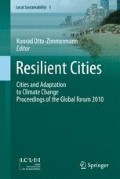Abstract
This study examines the impacts of strong rain events on local stakeholders in New Delhi, India, with the aim of developing effective adaptation and impact abatement options. Impacts are presented for various social groups – i.e., street food vendors and service providers, students, planners, other professionals and researchers – and analysed with respect to transportation, energy, water, health, food security and other issue areas. Under progressive climate change, strong rain events are projected to increase. Without adaptation, then, impacts will also increase. We use a fuzzy cognitive mapping approach and let stakeholders draw cause-effect networks. By ‘cutting’ certain cause-effect relations, its after-effects can be reduced and any such measure can be regarded as an adaptation option. Analysis reveals that local service providers and street food vendors are substantially worried about the economic losses connected with strong rain events, while other social groups care more about traffic jams and impacts on health. Scenario runs have shown that a climate change adaptation strategy that involves a reduction of local flooding would substantially reduce a multitude of impacts for all.
Access this chapter
Tax calculation will be finalised at checkout
Purchases are for personal use only
References
Isak K, Wildenberg M, Adamescu M, Skov F, De Blust G, Varjopuro R (2009) Manual for applying fuzzy cognitive mapping – experiences from ALTER-Net. Alter-Net final report
Kosko B (1986) Fuzzy cognitive maps. Int J Man Mach Stud 1:65 –75
Özesmi U, Özesmi SL (2004) Ecological models based on people’s knowledge: a multi-step fuzzy cognitive mapping approach. Ecol Modell 176:43 – 64
Parry ML, Canziani OF, Palutikof JP, van der Linden PJ, Hanson CE (eds) (2007) Contribution of working group II to the fourth assessment report of the intergovernmental panel on climate change. Cambridge University Press, Cambridge
Reckien D, Kit O, Hofmann S (2009) Qualitative climate change impacts networks for Hyderabad/India. First project report, BMBF
Wildenberg M, Bachhofer M, Adamescu M, De Blust G, Diaz-Delgadod R, Isak K, Skov F, Varjopuro R (2010) Linking thoughts to flows – fuzzy cognitive mapping as tool for integrated landscape modelling. In: Proceedings of the 2010 international conference on integrative landscape modelling – linking environmental, social and computer sciences, Montpellier, 3–5 Feb 2010
Acknowledgements
This work was part of the Climate Science and Policy Program of the TERI University in New Delhi, India and partly funded by the German Ministry for Education and Research (BMBF). We want to thank the M.Sc. students Anubha Agrawal, Deepika Duggal, Tashina Esteves, Shreya Garg, Abhishek Nair, Drishya Nair, Pallavi Sharma, Seema D. Venkatesh, and Padma Wangmo for their assiduous contributions, and Dr. Kamna Sachdeva for her excellent program managing and all her help. We also thank Michael Bachhofer for his critical reading and comments.
Author information
Authors and Affiliations
Corresponding author
Editor information
Editors and Affiliations
Rights and permissions
Copyright information
© 2011 Springer Science+Business Media B.V.
About this paper
Cite this paper
Reckien, D., Wildenberg, M., Deb, K. (2011). Understanding Potential Climate Change Impacts and Adaptation Options in Indian Megacities. In: Otto-Zimmermann, K. (eds) Resilient Cities. Local Sustainability, vol 1. Springer, Dordrecht. https://doi.org/10.1007/978-94-007-0785-6_3
Download citation
DOI: https://doi.org/10.1007/978-94-007-0785-6_3
Published:
Publisher Name: Springer, Dordrecht
Print ISBN: 978-94-007-0784-9
Online ISBN: 978-94-007-0785-6
eBook Packages: Earth and Environmental ScienceEarth and Environmental Science (R0)

